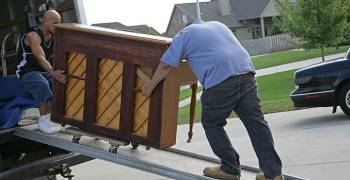© Top Dawg Movers All Rights Reserved. | The Website is Designed by SEOFIED IT SERVICES PVT LTD

Moving to a new home is an exciting yet challenging experience. However, amidst the excitement, it's essential to remain vigilant and protect yourself from potential moving scams. Unfortunately, fraudulent Florida moving companies prey on unsuspecting individuals during this vulnerable time. Discussed below are common red flags of moving scams in Florida and valuable tips on how to safeguard yourself and your belongings during the relocation process.
Red Flags of Moving Scams
Unrealistically Low Estimates: Beware of Florida moving companies that provide estimates significantly lower than other quotes you receive. Such offers may seem tempting, but they often lead to hidden charges or poor service.

Lack of Proper Licensing and Insurance: Legitimate Florida moving companies should have the necessary licenses and insurance to protect your belongings during the move. Always verify a company's credentials before hiring them.
No On-Site Inspection: Reputable movers in Florida conduct on-site inspections to assess the volume and weight of your belongings accurately. If a company refuses to perform an in-person survey, consider it a potential red flag.
Requests for Large Deposits: Avoid companies that demand a significant upfront deposit before the move. Established moving companies typically request payment upon delivery, not before.
Limited Communication and Unprofessional Behavior: Poor communication, delays in responses, and unprofessional behavior from movers are signs of unreliability. A reputable company maintains clear and prompt communication with clients.

Research and Verify Moving Companies
Check for Licensing: Verify the moving company's license with the Florida Department of Agriculture and Consumer Services (FDACS). Legitimate movers should have a Florida Intrastate Mover (IM) number.
Read Reviews and Testimonials: Read reviews and testimonials from previous customers to gauge the company's reputation and reliability.
Get Referrals: Ask friends, family, or colleagues for recommendations based on their positive moving experiences.
Check with Better Business Bureau (BBB): Look up the company on the BBB website to see if any complaints or negative reviews have been filed against them.

Get Multiple Quotes and Compare
Obtain quotes from at least three different moving companies and compare them. Be cautious of estimates that deviate significantly from the others. Ensure that each quote includes a detailed breakdown of all charges and fees.
Ask for a Written Contract
Insist on a written contract that clearly outlines all the terms and conditions of the move, including the estimated cost, payment details, delivery date, and any additional services.
Avoid Cash Payments
Avoid making cash payments to the moving company. Instead, use a secure payment method such as a credit card, which provides an additional layer of protection against fraud.
Consider Insurance Options
Inquire about the moving company's insurance coverage for your belongings during transit. Additionally, check with your homeowner's insurance to see if your possessions are covered during the move.